Docx files for personal book: Verbum 9 part 1; Verbum 9 part 2; Verbum 9 part 3; Verbum 9 part 4; How to use the Verbum Lectionary and Missal; Verbum 8 tips 1-30; Verbum 8 tips 31-49
Reading lists: Catholic Bible Interpretation
Please be generous with your additional details, corrections, suggestions, and other feedback. This is being built in a .docx file for a PBB which will be shared periodically.
Previous post: Verbum Tip 7l Next post: Verbum Tip 7n
Basic search
Everything has been covered except the building of the search article has been covered. While the search terms learned for the Bible search apply to the Basic search, there are some differences in emphasis:
- As the basic search are used by the full range of resources, text arguments applicable to untagged resources are more prominent than the datatype argument common in the highly tagged Bibles.
- Some labels apply to resources available only for the Basic search – Personal Letter, Journal Article, Bible Outline, Sermon, Lectionary Reading . . .
Search panel
Panel menu parameters
From Verbum Help regarding Panel Menu options:[quote]
• Send Searches Here — Performs any new searches (e.g., from the Context menu) in the current tab of the Search panel, instead of opening a new tab for each search.
• Match Case — Makes your search case-sensitive, requiring search results to match the capitalization of your search query.
• Match All Word Forms— Includes results of all forms of your search term in the search results. For example, results for a search for “love” would include “loved,” “lovely,” “loving,” etc.
• Match Equivalent References — Sets your search to include equivalent references to biblical themes, etc. For example, in a default Basic search, searches for <event creation>, <topic creation>, or <theme creation> yield different results. Selecting Match Equivalent References combines the results of these searches.[1]
Note there is no “Show whole verse” option as there is in the grid view of a Bible search.
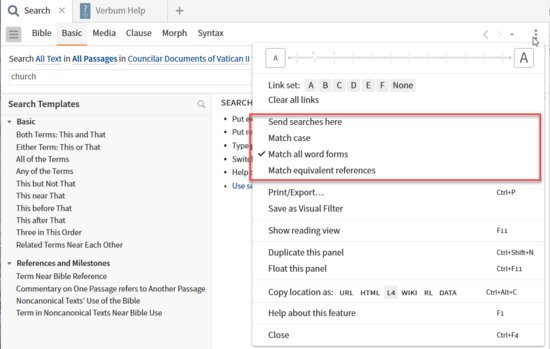
Which of the following searches has “match case” set?
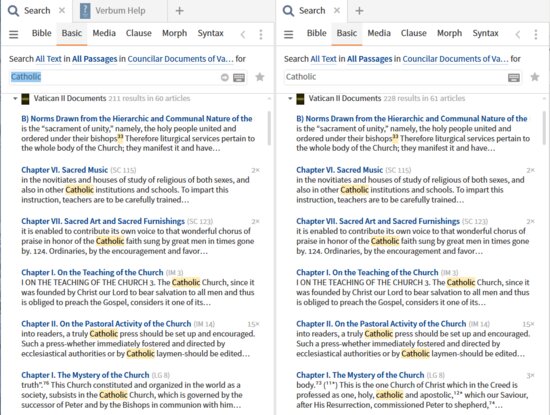
The left side requires matching of the capital case. The final entry provides the proof because the right side picks up “catholic” in “one, holy, catholic, and apostolic” while the right side does not.
Which of the following searches has match “all word forms” set?
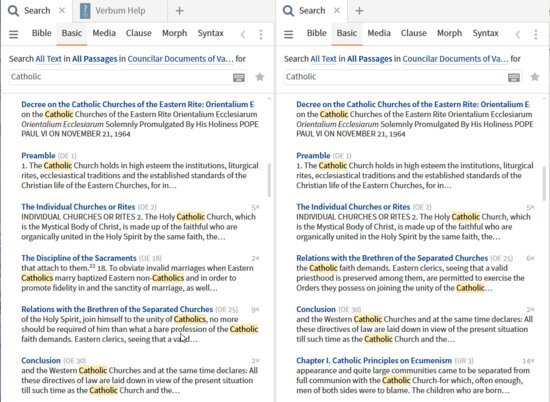
Again it is the left side that has “match all word forms” set as one can tell from the plural form in the results under articles “The Discipline of the Sacraments” and “Relations with the Brethren of the Separated Churches”.
Which of the following searches has “match equivalent references” set?
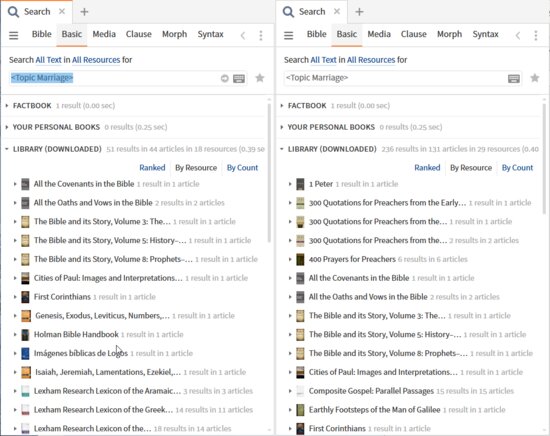
Setting “match equivalent references” will never remove matches. Therefore, the right side, which has the larger number of matches is the search with the option set. To prove this, open the first resource to the selected result and not it is coded as “Preaching theme” rather than as “Topic”.
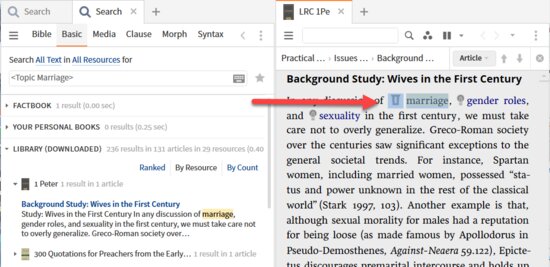
Search Helps
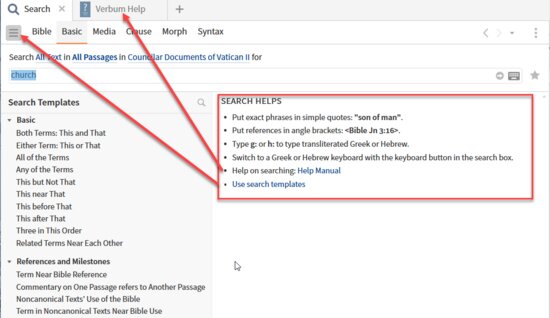
Put exact phrases in simple quotes
“Son of man” as a text argument requires all three words in that order without intervening words. Put more simply, it requires the phrase.
Son of man as a text argument requires all three words somewhere in the article. It is read as requiring “son” AND “of” AND “man” in any sequence, any number of occurrences, intervening material allowed.
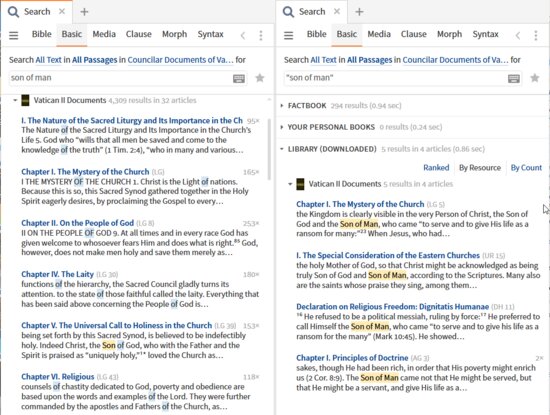
Put references in angle brackets
This is a reminder that:
- “Jn 3:16” looks for the characters in the same way it would look for a word
- <Jn 3:16> is a datatype that looks for references to Jn 3:16
- {Milestone <Jn 3:16>} is a milestone that looks for occurrences of John 3:16
The same distinctions apply to many other datatypes, for example:
- “Sacrosanctum concilium 5” looks for the characters in the same way it would look for a word
- <VaticanII = Sacrosanctum concilium 5> is a datatype that looks for references to Sacrosanctum concilium 5
- {Milestone <VaticanII = Sacrosanctum concilium 5>} is a milestone that looks for occurrences of Sacrosanctum concilium 5
On the left side is the text search; on the right, the top search argument is copied via copy reference: search in the context menu, the lower is manually modified for looser requirements.
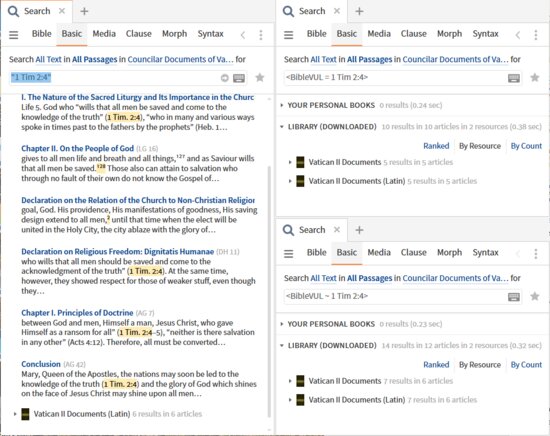
Type g: or h: to type transliterated Greek or Hebrew
To find the transliteration of Greek or Hebrew when you have only the original script, go to Tools à Interactive Media à Text converter.
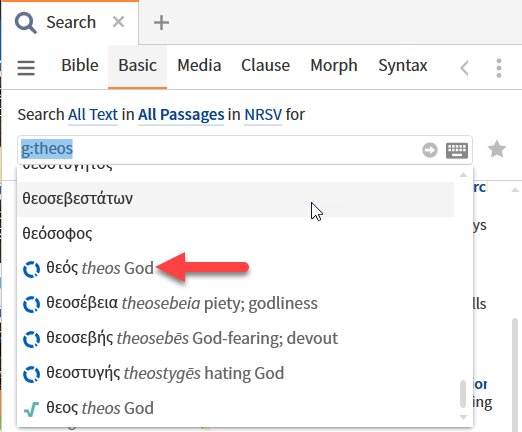
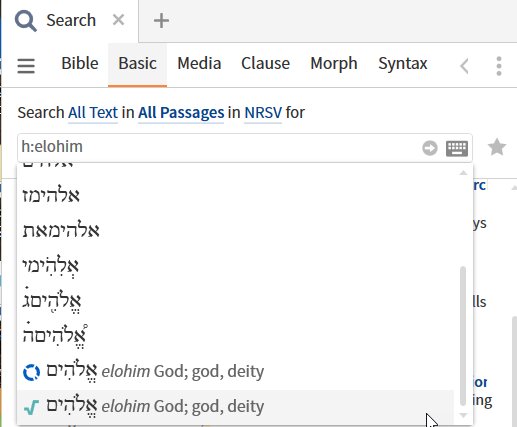
Switch to a Greek or Hebrew keyboard
The keyboard menu has the following options:
- Default
- Greek
- Hebrew
- Open Verbum Help
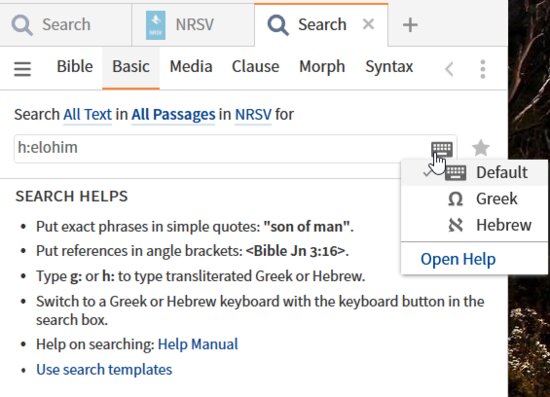
Help on searching: Help Manual
The phrase “Help Manual” is a simple link to open Verbum Help i.e. the same as the final option of the keyboard menu. Mouse over shows that it will open to Basic Search.
Use search templates
Clicking on Use search template (1) is equivalent to clicking on the open left panel icon (2) which results in opening the template panel (3).
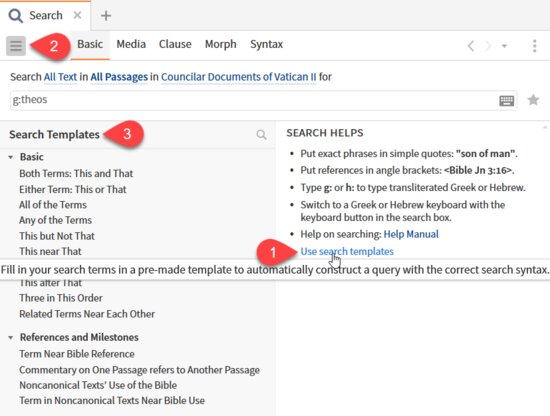
[1] Verbum Help (Bellingham, WA: Faithlife, 2018).